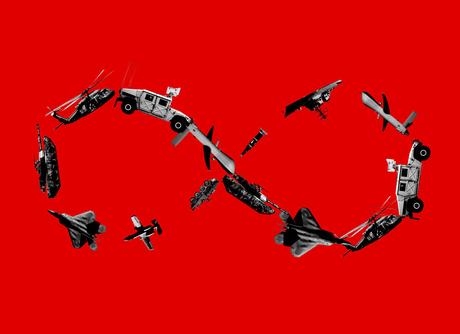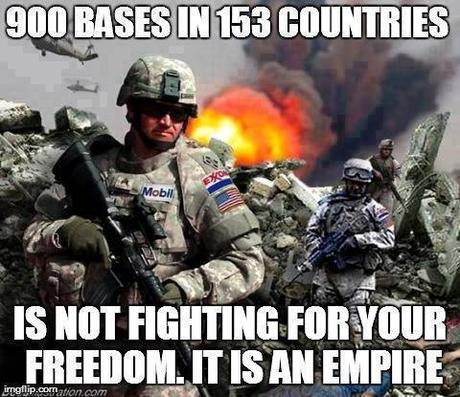There is a fantastic, long, long overdue article in today's Sunday New York Times that says everything I and a lot of us have ever thought about present day America, our defense spending and our insane, inane perpetual, endless war.

The Only Way to End ‘Endless War’
First, America has to give up its pursuit of global dominance
Dr. Stephen Wertheim
As I said, I think all Americans should read it, all of it, absolutely but herewith, I'll post just a few of the most important quotes and clips. I'll begin with a stunner from none other than Republican Party President Donald J "the John" Trump.
“Great nations do not fight endless wars.”
“We have got to put an end to endless war,” declared Mayor Pete Buttigieg of South Bend, Ind., during the Democratic presidential primary debate on Thursday. It was a surefire applause line: Many people consider “endless war” to be the central problem for American foreign policy.
But vowing to end America’s interminable military adventures doesn’t make it so. Four years ago, President Barack Obama denounced “the idea of endless war” even as he announced that ground troops would remain in Afghanistan. In his last year in office, the United States dropped an estimated 26,172 bombs on seven countries.
President Trump, despite criticizing Middle East wars, has intensified existing interventions and threatened to start new ones. He has abetted the Saudi-led war in Yemen, in defiance of Congress. He has put America perpetually on the brink with Iran. And he has lavished billions extra on a Pentagon that already outspends the world’s seven next largest militaries combined.
Dominance, assumed to ensure peace, in fact guarantees war.
In theory, armed supremacy could foster peace. Facing overwhelming force, who would dare to defy American wishes? That was the hope of Pentagon planners in 1992; they reacted to the collapse of America’s Cold War adversary not by pulling back but by pursuing even greater military pre-eminence. But the quarter-century that followed showed the opposite to prevail in practice. Freed from one big enemy, the United States found many smaller enemies: It has launched far more military interventions since the Cold War than during the “twilight struggle” itself. Of all its interventions since 1946, roughly 80 percent have taken place after 1991.
Why have interventions proliferated as challengers have shrunk? The basic cause is America’s infatuation with military force. Its political class imagines that force will advance any aim, limiting debate to what that aim should be. Continued gains by the Taliban, 18 years after the United States initially toppled it, suggest a different principle: The profligate deployment of force creates new and unnecessary objectives more than it realizes existing and worthy ones.
In the Middle East, endless war began when the United States first stationed troops permanently in the region after winning the Persian Gulf war in 1991. A circular logic took hold. The United States created its own dependence on allies that hosted and assisted American forces. It provoked states, terrorists and militias that opposed its presence. Among the results: The United States has bombed Iraq almost every year since 1991 and spent an estimated $6 trillion on post-9/11 wars....
Armed domination has become an end in itself. Which means Americans face a choice: Either they should openly espouse endless war, or they should chart a new course.
...the United States should pursue the safety and welfare of its people while respecting the rights and dignity of all. In the 21st century, finally rid of colonial empires and Cold War antagonism, America has the opportunity to practice responsible statecraft, directed toward the promotion of peace. Responsible statecraft will oppose the war-making of others, but it will make sure, first and foremost, that America is not fueling violence.
On its own initiative, the United States can proudly bring home many of its soldiers currently serving in 800 bases ringing the globe, leaving small forces to protect commercial sea lanes. It can reorient its military, prioritizing deterrence and defense over power projection. It can stop the obscenity that America sends more weapons into the world than does any other country. It can reserve armed intervention, and warlike sanctions, for purposes that are essential, legal and rare.
Shrinking the military’s footprint will deprive presidents of the temptation to answer every problem with a violent solution. It will enable genuine engagement in the world, making diplomacy more effective, not less. As the United States stops being a party to every conflict, it can start being a party to resolving conflicts...
Today a world with less American militarism is likely to have less militarism in general.
...there’s a reason no one can connect the dots from unceasing interventions to a system of law and order. After decades of unilateral actions, crowned by the aggressive invasion of Iraq, it is U.S. military power that threatens international law and order. Rules should strengthen through cooperation, not wither through imposition.
In truth, the largest obstacle to ending endless war is self-imposed. Long told that the United States is the world’s “indispensable nation,” the American people have been denied a choice and have almost stopped demanding one. A global superpower — waging endless war — is just “who we are.”
But it is for the people to decide who we are, guided by the best of what we have been. America “goes not abroad in search of monsters to destroy,” Secretary of State John Quincy Adams said in 1821. “She might become the dictatress of the world. She would be no longer the ruler of her own spirit.”
Two centuries later, in the age of Trump, endless war has come home. Cease this folly, and America can begin to take responsibility in the world and reclaim its civic peace.
Benefits to the nation, to us all, if we were to do this?
- First and foremost, it would save our military soldiers' lives..
- As the article points out so clearly, it would reduce war and terror in the world.
- Next, it would cut our spending, our obscene government spending
- We could spend far more wisely on our infratstructure--schools, bridges, roads, HEALTHCARE.
- In short, we could support and invest in our people, in the nation. Imagine better roads, smarter healthcare, better schools, no poverty, fewer, in not zero Americans on the street, impoverished, sick, etc.
- Finally, on this short list, we could also SAVE MONEY.
We have been in Aghanistan EIGHTEEN YEARS. Does anyone really think we've improved things over there? Worse, does anyone think we will (improve things there)?
Finally, here today, for anyone who says we must keep up our "defense spending" because have a "war on terror", I quote the following:
"We will bankrupt ourselves in the vain search for absolute security." --Dwight D. Eisenhower
"The catch-all phrase "the war on terrorism", in all honesty, has no more meaning than if one wants to wage a war against "criminal gangsterism". Terrorism is a tactic. You can't have a war against a tactic. It's deliberately vague and non-definable in order to justify and permit perpetual war anywhere and under any circumstance." --Ron Paul
"Always there has been some terrible evil at home or some monstrous foreign power that was going to gobble us up if we did not blindly rally behind it." --Douglas MacArthur
"Terrorism is the war of the poor, and war is the terrorism of the rich." --Peter Ustinov
"Our government has kept us in a perpetual state of fear - kept us in a continuous stampede of patriotic fervor - with the cry of grave national emergency." --Douglas MacArthur
"We cannot simply suspend or restrict civil liberties until the War on Terror is over, because the War on Terror is unlikely ever to be truly over." --Gerald Bard Tjoflat
"Terrorists can endanger some of us, but the war on terror endangers us all. How much more can the Constitution be diminished before it is completely replaced by arbitrary government power?" --Paul Craig Roberts
And the best, most true quote on the "war on terrorism" nonsense comes, for me, from Gore Vidal:
“You can’t have a war on terrorism because that’s not an actual enemy, it’s an abstract. It’s like having a war on dandruff. That war will be eternal and pointless. It’s idiotic. That’s not a war, it’s a slogan. It’s a lie. It’s advertising, which is the only art form we ever invented in America. And we use it to sell soap, war and presidential candidates in the same fashion.”

